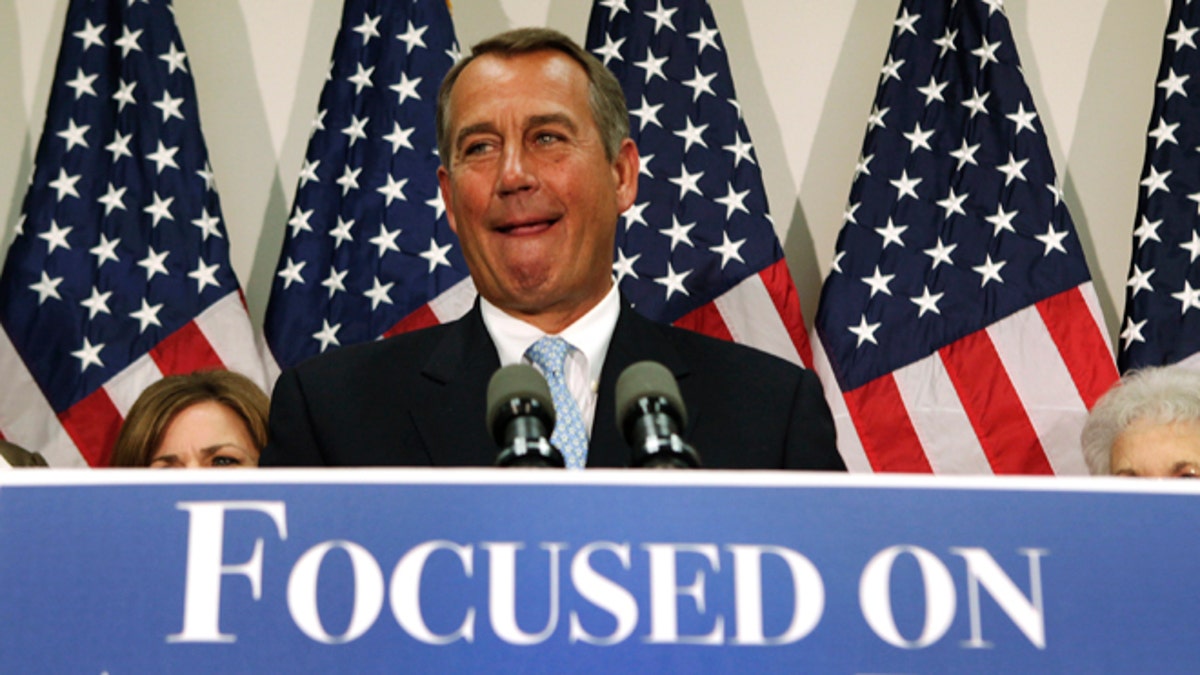
Nov. 28, 2012: House Speaker John Boehner at a news conference on Capitol Hill in Washington. (REUTERS)
House Republican leaders said Wednesday they’ve done their job in negotiations to solve the looming fiscal crisis, while President Obama is returning to the campaign trail to sell tax hikes that studies show won't have much, if any, effect on solving the problem.
“We have done our part by putting revenue on the table,” said House Majority Leader Eric Cantor.
Cantor and fellow House leaders have agreed to close tax loopholes to generate revenue to reduce the $1.1 trillion annual deficit. But they argue the president has yet to say publicly what cuts he will make to the federal budget -- specifically to costly entitlement programs such as Medicare, Medicaid and Social Security -- to reduce the deficit.
They also say the president’s plan to extend tax cuts only to middle-class Americans will not generate enough revenue to significantly reduce the deficit.
The leaders made their argument the same day Gene Sperling, director of the president’s National Economic Council, told House Democrats that failing to extend Bush-era tax cuts to the top 2 percent of income earners could trickle down to hit the middle class, sources tell Fox News.
On Wednesday afternoon, the president ramped up his public pitch amid a backdrop of hand-picked, middle-class voters at the White House.
"Right now, as we speak, Congress can pass a law that would prevent a tax hike on the first $250,000 of everybody's income,” he said. "And that means that 98 percent of Americans and 97 percent of small businesses wouldn't see their income taxes go up by a single dime."
He also urged Americans to use social media to try to persuade their congressional representatives to take the deal – telling them to use Facebook and their Twitter accounts. Obama even announced a new White House hashtag My2K -- a reference to the estimated $2,200 tax increase that a typical middle-class family of four would see if the Bush tax cuts expire.
The president met later in the day with top U.S. business leaders to discuss his strategy and is scheduled Friday to host a rally in the Philadelphia area to again tout his plan.
Among the chief executive officers who were scheduled to attend the event were Muhtar Kent of Coca-Cola, Home Depot's Frank Blake and Brian Roberts of Comcast.
Texas Sen. John Cornyn on Wednesday joined the chorus of Republican leaders appealing to the president to instead get engaged in negotiations, saying he has no public plan for cuts while continuing to criticize Republicans for demanding a tax-cut extension for all Americans.
“All that Republicans are asking is to maintain the current rates until we adopt real bipartisan tax reform,” Cornyn said in an editorial Wednesday in the Dallas Morning News.
However, later in the day, it was announced that two of Obama's chief negotiators will meet Thursday with congressional leaders to gauge prospects for a deal.
Treasury Secretary Timothy Geithner and White House legislative chief Rob Nabors will meet separately with House Majority Leader John Boehner, Senate Minority Leader Mitch McConnell of Kentucky, Senate Majority Leader Harry Reid, D-Nev., and House Minority Leader Nancy Pelosi of California.
The White House and Congress are trying to reach a deal before Jan. 1 – when all of the Bush-era tax cuts are set to expire and huge reductions to the federal budget kick in automatically. Those spending cuts are part of a default agreement by Congress after it failed reach a more measured deal to reduce the roughly $1.3 trillion annual deficits that have brought the national debt to more than $16 trillion.
The mix of tax increases and budget cuts will equal roughly $100 billion alone next year and about $1.2 trillion over the next 10 years should Congress and the White House fail to reach a deal. Some economists say that could plunge the economy into a recession.
Cantor was joined at a Capitol Hill press conference by House Majority Leader John Boehner, Majority Whip Rep. Kevin McCarthy and Rep. Cathy McMorris Rodgers, incoming chairwoman of the House Republican Conference.
Cantor also said he was pleased to see that senior Obama adviser David Plouffe note that Medicare and Medicaid are drivers of the deficit.
Pelosi at a separate Capitol Hill press conference furthered the Democrats argument that the party has already made cuts.
“We have already agreed to over a trillion dollars in cuts,” The California congresswoman said. “We're looking to see what the revenue piece will be to that.”
The first cracks appeared to be developing among Republicans over whether to accept Obama’s deal.
"If we don't believe taxes should go up on anybody, why can't we accept a deal that takes 98 percent out and still leaves us free to fight on the other grounds," said Oklahoma Republican Rep. Tom Cole, a confidant of Boehner.
Still, Cole's comments drew a rebuke from Boehner, who is standing firm against Obama's demand that tax rates go up for top earners.
"He's a wonderful friend of mine and a great supporter of mine, but raising taxes on the so-called top 2 percent -- half of those taxpayers are small business owners," Boehner said. "You're not going to grow the economy if you raise the top two rates."
Erskine Bowles, a former Clinton chief of staff who has been active in trying to help reach a deal, said if negotiators fail to reach a deal the country is “going to go over the cliff.”
“And I think everybody realizes that would be disaster. If we go over the cliff, you’re going to have slowdown in economic growth. That puts us back into a recession.”
The Associated Press contributed to this report.




